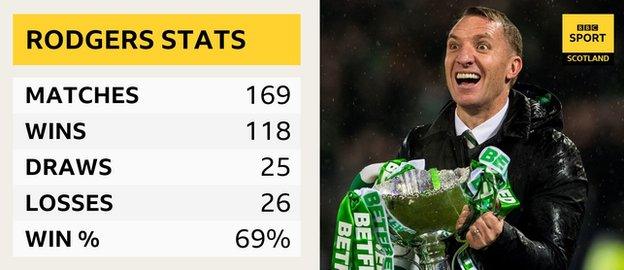Brendan Rodgers: Manager's exit from Celtic for Leicester is no surprise
- Published

Brendan Rodgers has won every domestic trophy for which he has competed at Celtic
Only the greenest of Celtic fans could have persuaded themselves that Brendan Rodgers was going to be around long enough for the 10-in-a-row they have sung about for the longest time.
Only the most hopeful of Hoops could have envisaged an ambitious manager being prepared to bounce his head off a glass ceiling in Glasgow's east end for another two and a half years.
No question, Rodgers gave the supporters reason to believe that he wouldn't leave in the short-term, but that's a game managers play - and have to play. Badge kissing is not the exclusive preserve of footballers.
Among Celtic folk, there will be frustration and some fury that he's going to Leicester City now, mid-season when a Treble-Treble is up for grabs. Even those who accepted that he was going to depart soon would have at least expected him to stay until the summer.
Disappointing for sure. But not wholly unexpected. Sentiment nearly always gets trumped by ambition in football.
'Celtic's dominance is compromised'
If the east end of Glasgow is reverberating to the sound of groaning, there is an altogether different tune being sung around the rest of the country. Rodgers' apparently imminent departure would mean that Celtic's dominance in Scotland has been compromised.
Rangers are currently eight points behind them in the Scottish Premiership. Eight points is still a lot, but given the turbulence that Celtic may now experience at the loss of the man who created the Scottish Invincibles, it may not be the insurmountable total that it looked a few days ago, so long as Steven Gerrard's team reel off win after win. That's a big 'if' but this news will buoy Rangers no end. And Aberdeen in their slipstream. And Hibs who play Celtic in the Scottish Cup at the weekend.
In the three seasons before he arrived in Scotland, the cup trophies were dished out far and wide. Hibs, Ross County, Inverness Caledonian Thistle, St Johnstone and Aberdeen all won silverware. Rodgers brought an end to that. Aberdeen have been beaten in three finals by the Northern Irishman's team. Suddenly, in a post-Rodgers landscape, there is hope again for the rest.

Neil Lennon has taken charge as interim manager. It's an understandable choice, but as successful as his previous spell was at Celtic Park, Lennon never got anywhere near Rodgers' utter stranglehold on domestic business. His team lost a Scottish Cup semi-final to Ross County in his early months in the job; lost a League Cup final to Rangers in his first full season; lost another League Cup final to Kilmarnock and a Scottish Cup semi-final to Hearts in his second season; lost a League Cup semi-final to St Mirren the season after that; and a year after his team was put out of the League Cup in the third round by Morton and in the fifth round of the Scottish Cup by Aberdeen.
Rodgers' team have not lost a cup tie in two and half seasons. Even allowing for their vast financial advantage over all others it's pretty remarkable that not one team has caught them out on one given day. The Treble-Treble almost had an air of inevitability about it until the news of Leicester's approach was confirmed. Without their inspirational manager, it's up in the air again.
'Scottish game was never going to sate Rodgers'
Celtic were always going to get to this point sooner rather than later. Last summer the irresistible object of Rodgers' ambition met the immovable force of Peter Lawwell's practicality and it's been tense ever since. As chief executive, Lawwell is not known for flights of fancy with the cheque book. Lawwell went as far as he felt he could, but no further.
Stress entered the equation. This is how it ended for Lennon as well. The financial reality of Celtic's life in Scotland makes it inevitable that driven managers only stick around for so long before getting frustrated or getting poached.
For all that he publicly bought into staying on in pursuit of the fabled 10-in-a-row, the Scottish game was never going to be enough to sate Rodgers. He wanted to build a team that would have had a better than decent chance of kicking on in Europe, but that would have cost the kind of money that would have put Celtic on shaky ground. It was never, ever going to happen.
Wrong to say Rodgers wasn't backed - McDonald
It's a criticism of Rodgers that once qualified in Europe he failed thereafter. The rigidity of his thinking was exposed against the best. Nobody would have expected him to pull out a box office victory against the cast of heavyweights - Manchester City, Barcelona, Bayern Munich and Paris St-Germain - he was thrown in with in the Champions League, but that's precisely what some of his predecessors did.
Gordon Strachan found a way of beating Manchester United and AC Milan. Lennon found a way of beating Barcelona. When Lennon's Celtic team went to Camp Nou, they lost 2-1 to a goal that came deep into added time. When Rodgers' team went there they got annihilated 7-0.
All of this - and the 7-1 drubbing by PSG - has to be taken into account when assessing him, but overall his impact has been huge. Rodgers has genuinely loved being at Celtic. He's had some momentous days, has won seven trophies, has improved players who were at a low ebb before his arrival and has galvanised a support that were losing faith at the end of the Ronny Deila era.
Celtic Park had become a hushed place until Rodgers fetched-up. Thousands of empty seats were the norm. No longer. He's also made the club money. A lot of money. Two Champions League qualifications plus a multi-million pound profit on striker Moussa Dembele. That's knocking on for £80m. He turned midfielder Stuart Armstrong around and then sold him to Southampton. That was another £7m.
There were mis-steps in the market as well - too many, you might argue - but there's no question that Rodgers has been terrific for Celtic and Celtic have been terrific for Rodgers. The fans have serenaded him at every turn. When English football fans in general, and Liverpool fans in particular, mocked him when he lost his first competitive game against Lincoln Red Imps in Gibraltar, the reaction was interesting.
'Disgusted with the decision' - Celtic fans react to Rodgers news
'Will Celtic's aura exit with him?'
In parts of the football landscape down south, Rodgers was deemed talented but narcissistic, a man who took Swansea forward and almost won the league with Liverpool but who also loved himself into the bargain. His ego was part of the reason for his success and part of the reason why some in England found it so easy to make fun of him.
Rodgers would have hoped for a top-six club in England, but that was never going to happen. Of the next six in the table, the Leicester job is as good as any and better than most. This is an underperforming, unhappy team, a club with an admirable squad that's currently sitting only eight points above a relegation spot despite having spent more than £100m on players in the summer and another £186m in the three summers before that.
They've had the dour, deflating Frenchman, Claude Puel, in charge and he's changed the way they play, from the speed and effervescence of their Premier League-winning season to something more slow-paced and failing.
Rodgers' philosophy and personality is what they feel they need. It's exactly what Celtic felt they needed when bringing him to Glasgow in the first place. He's leaving now. Certainty is being replaced by uncertainty. Another treble doesn't look so much of a shoo-in anymore. When Rodgers exits you have to wonder how much of Celtic's domestic aura is going to exit with him.